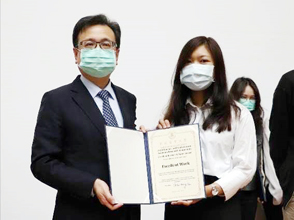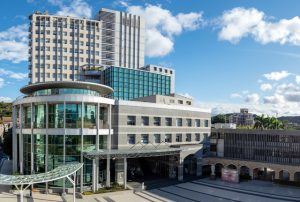我是Liling Delila,是醫學工程學院生醫材料暨組織工程研究所博士候選人,現在正就讀於法國里爾大學的雙聯學位學程,目前是我最後一年的學習。
 我在印尼獲得化學學士學位,然後在臺北醫學大學取得生醫材料暨組織工程研究所碩士學位,現在持續攻讀博士學位。我在生物醫學工程方面的研究,讓我對生物材料及其在再生醫學中的各種不同應用有透徹的了解,作為我研究主題的一部分,包括使用含有神經營養因子和抗氧化劑的血小板裂解物,以及它們在神經元癒合和再生中的潛在作用。在法國里爾,神經科學方面的研究同樣讓人著迷;它讓我對大腦和神經系統的複雜運作大開眼界,尤其是在神經系統疾病及其潛在治療方法。
我在印尼獲得化學學士學位,然後在臺北醫學大學取得生醫材料暨組織工程研究所碩士學位,現在持續攻讀博士學位。我在生物醫學工程方面的研究,讓我對生物材料及其在再生醫學中的各種不同應用有透徹的了解,作為我研究主題的一部分,包括使用含有神經營養因子和抗氧化劑的血小板裂解物,以及它們在神經元癒合和再生中的潛在作用。在法國里爾,神經科學方面的研究同樣讓人著迷;它讓我對大腦和神經系統的複雜運作大開眼界,尤其是在神經系統疾病及其潛在治療方法。
我還參與使用血小板衍生生物材料的研究,並評估它們在帕金森氏病(PD)模型中的神經保護作用,在那裡我獲得一些技術實用專業知識,例如腦組織學、免疫組織化學和囓齒動物行為評估。【右圖:北醫的印尼外籍生赴法里爾大學攻讀雙聯學位】
在兩個不同的實驗室領域和國家攻讀雙聯學位是個獲益良多的經驗,這是個絕佳的機會,我非常感謝這個項目以及臺北醫學大學醫學工程學院和里爾大學生物與健康科學研究所之間的合作,當然,我衷心感謝北醫大的白台瑞教授和 David Devos教授及其團隊(法國里爾的法國國家健康與醫學研究院、里爾大學醫學中心、U1172、里爾神經科學與認知中心)。
 身為在兩個不同實驗室和國家(臺灣和法國)攻讀雙聯學位的學生,我有機會體驗兩種完全不同的學術和文化環境,這段學術之旅不僅為我在兩個不同的實驗室領域打下良好基礎,同時也開拓我對世界不同地區的研究方式更廣闊的視野。我們交流知識和技能,包括我在法國所學的某些技術和實驗,我把這些運用於臺灣的實驗室,反之亦然,這無疑也對我的研究和兩個實驗室都帶來好處。【左圖:Liling Delila(右)參加本校109學年度師生聯合學術研究發表會,獲得「優秀論文獎」並與林建煌校長(左)合影】
身為在兩個不同實驗室和國家(臺灣和法國)攻讀雙聯學位的學生,我有機會體驗兩種完全不同的學術和文化環境,這段學術之旅不僅為我在兩個不同的實驗室領域打下良好基礎,同時也開拓我對世界不同地區的研究方式更廣闊的視野。我們交流知識和技能,包括我在法國所學的某些技術和實驗,我把這些運用於臺灣的實驗室,反之亦然,這無疑也對我的研究和兩個實驗室都帶來好處。【左圖:Liling Delila(右)參加本校109學年度師生聯合學術研究發表會,獲得「優秀論文獎」並與林建煌校長(左)合影】
我深入了解研究中的文化差異,例如溝通和職業道德,這拓展我的研究視野,在臺灣,我與其他同學有更多的互動,一起學習和討論,但在里爾,有更多的專業人士和資深研究人員,驅使我適應並加速我的學習能力。來到一個新的國家,不同的文化和環境可能具有挑戰性,但它教會我放開心胸並且擁有適應能力。
此外,獲得雙聯學位最顯著的好處之一,尤其對我而言,是在生物醫學工程和神經科學領域,橋接彼此差異的機會,我開始明白這些學科如何在人類健康和疾病的背景下相互交叉和互補。
在未來,我很想開發一種新的方式,將藥物或小分子肽/神經營養因子,定位大腦的特定區域,並可控制藥物的釋放,由於目前還沒有神經性退化疾病的治療方法,因此可測試以這個方式遞送可保護神經元或誘導新神經元形成的藥物來治療疾病,我也一直很好奇年輕/成年神經元的神經新生涉及哪些因素和機制,因為這是我所在的白台瑞教授實驗室進行的一個熱門話題。
總體來說,能在這兩個機構的學習經歷讓我感到榮幸和感激,非常感謝能獲得這樣的機會,相信這對我未來的學術和專業工作有所助益。(文/ Liling Delila,醫學工程學院生醫材料暨組織工程研究所博士候選人)
My name is Liling Delila, and I am in PhD candidate at GIBMTE, CBME, and TMU. I am now enrolled in a dual degree program with ULille, France, and currently in my final year of studies.
I obtained my Bachelor’s degree in Chemistry from Indonesia and then pursued my Master’s degree in Biomedical Engineering, CBME, TMU and now pursuing my PhD at the same institution.My study in biomedical engineering has provided me with a thorough understanding of biomaterials and their various applications in regenerative medicine, as part of my research topic, including the use of platelet lysates, which contain neurotrophic factors and antioxidants, and their potential roles in neuronal healing and regeneration. In Lille, my study in neurosciences have been equally fascinating; it has opened my eyes to the intricate workings of the brain and nervous system, particularly in neurological disorders and their potential treatments.
I have also been involved in research studies using platelet-derived biomaterials and assessing their neuroprotective activity in Parkinson’s disease (PD) models, where I obtained practical expertise in some technique such as brain histology, immune-histochemistry, and rodent behavioral assessments.
Pursuing a dual degree in two separate laboratory fields and nations has been a rewarding experience. It was a really great opportunity. I am so grateful of this program and the collaboration between CBME, TMU and Graduate School of Biology and Health Sciences, ULille. Indeed, my sincere thanks to Prof. Thierry Burnouf at TMU and Prof. David Devos and his team (Inserm, CHU-Lille, U1172, Lille Neuroscience & Cognition, Lille, France),
As a student pursuing a dual degree in two different laboratories and countries, Taiwan and France, I have had the opportunity to experience two distinct academic and cultural environments. This academic journey has not only provided me with an excellent basis in two different laboratory fields, but it has also allowed me to develop a broader perspective on how research is conducted in different parts of the world. We exchanged knowledge and skills, including certain techniques and experiments I learnt in France, I transport it to Taiwan to be used in the lab here and vice versa, which for sure it benefits my research and both labs.
I have gained insight into the cultural differences in research, such as communication and work ethics, which has broadened my perspective on research. In Taiwan, I had more interactions with other fellow students, to learn and discuss together but in Lille there were more professionals and senior researchers, which pushed me to adapt and accelerate my learning abilities. Moving to a new country might be challenging, with different cultures and environment, but it has taught me to be open-minded and adaptable.
Moreover, one of the most notable benefits of taking a dual degree, especially in my case, in the fields of Biomedical Engineering and Neuroscience, It has been an opportunity to bridge the gap between each other. I have come to realize how these disciplines cross and complement one another in the context of human health and disease.
In the future, I would be interesting to work on the development of drugs or small peptides/neurotrophic factors with a new approach of delivery, to target specific regions of the brain and release drugs in a controlled manner. As there is currently no treatment for neurodegenerative diseases, this approach could be tested to treat illnesses by delivering medications that can protect neurons or induce the formation of new neurons. I have also been curious about what factors and mechanisms are involved in neurogenesis in young/adult neurons, as this is one of exiting topic conducted in Prof Thierry Burnouf’s lab where I am in.
Overall, once again I am honored and grateful for the educational experiences that I had experiences in both institutions, I am quite thankful for the opportunities I received, which I believe will be useful in my future academic and professional work.

